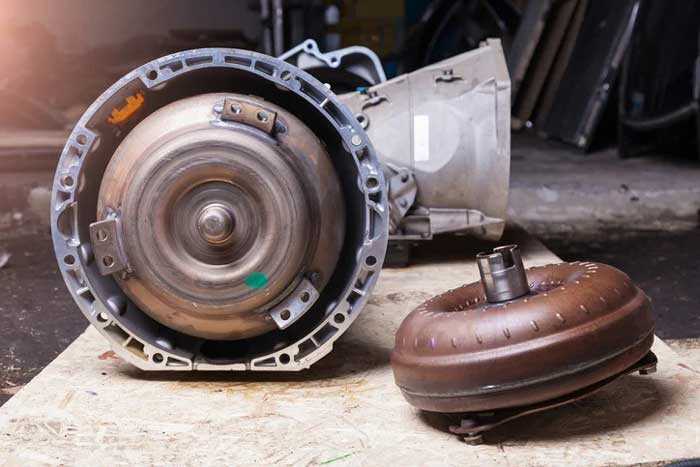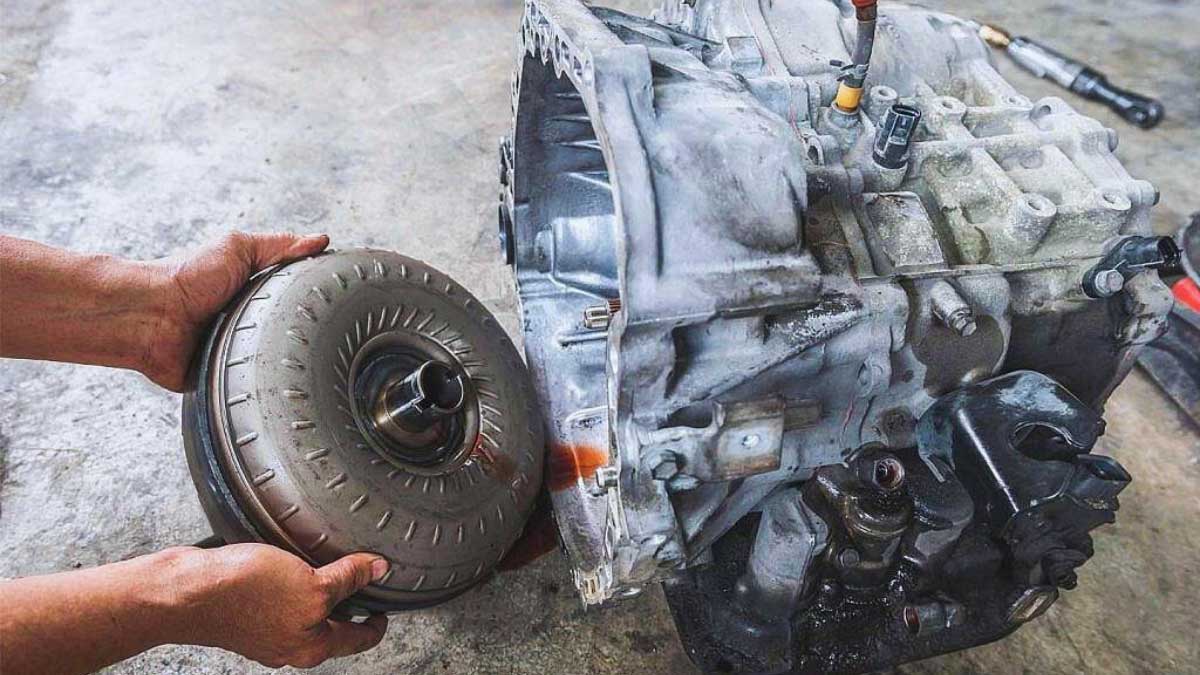So, you’re cruising down the road, feeling like you and your car are in perfect sync. But suddenly, there’s a hiccup – a weird shudder, a mysterious lack of power. Is it the dreaded bad torque converter or the nightmare-inducing bad transmission? Buckle up, folks, because we’re diving into the world of car troubles, where every clunk and whine has a story to tell.
Picture this: you’re at a stoplight, and your car decides to do the electric boogaloo instead of a smooth idle. Is it the torque converter misbehaving, or is the transmission playing hide-and-seek with your sanity? Don’t worry, I’ve been down this road before, and let me tell you, it’s a wild ride of diagnostic dilemmas and mechanical mysteries.
Understanding Torque Converters and Transmissions
Ah, torque converters and transmissions, the dynamic duo of your car’s power play. Let’s jump into the world of gears and torque with a sprinkle of humor!

What Is a Torque Converter?
Imagine a magician’s trick but in your car – that’s a torque converter! It’s the wizard behind the curtain, silently transferring power from your engine to the wheels. No rabbit in a hat, just pure mechanical finesse.
What Is an Automatic Transmission?
An automatic transmission is like having a personal chauffeur – it does all the gear-shifting work for you. It’s the unsung hero that ensures your ride is smooth, effortless, and drama-free. Think of it as your car’s very own butler, gracefully handling all the gear changes so you can focus on the road ahead.
Signs of a Bad Torque Converter
Ah, the mysteries of car troubles! Let’s jump into the quirky world of torque converters and unravel the signs that indicate they might be up to some mischief.
Shuddering and Vibration
When your car starts doing the jitterbug without your permission, it could be a sign that your torque converter is up to no good. Imagine your car trying out for a dance competition without your consent – that’s the level of shuddering and vibration to watch out for.
Unusual Noises
Cars are supposed to purr like contented kittens, not growl like disgruntled bears. If you’re hearing strange clunks, whirrs, or whines that sound like they don’t belong in your vehicle’s playlist, it might be your torque converter trying to serenade you with its offbeat tunes.
Contaminated Transmission Fluid
Picture this: your car’s transmission fluid is like a refreshing drink for your vehicle’s insides. But if it starts looking more like a murky swamp than a clean elixir, your torque converter might be playing dirty and contaminating the fluid. Time to give that torque converter a good talking to!
Overheating
Cars are not fans of hot flashes – and neither are torque converters. If your vehicle’s temperature gauge starts creeping into the red zone more often than not, it’s like your torque converter is throwing a temper tantrum and heating things up more than it should. Time to cool down and get that torque converter some chill pills!
Symptoms of Transmission Problems
Ah, the joys of car troubles, where each strange sound or smell turns into a mystery novel! Let’s jump into the quirky signs that your transmission might be feeling under the weather.
Delay in Gear Engagement
When I press the pedal and my car takes a moment to decide which gear to wear, it’s like waiting for a fashionably late friend. A delay in gear engagement could mean your transmission needs a little pep talk.
Inability to Shift Gears
Imagine driving a car that’s stuck in one gear, like dancing the tango but only knowing how to do the cha-cha. If your vehicle refuses to shift gears smoothly, it might be time to give your transmission some TLC.
Strange Smells
Ah, the lovely bouquet of burning or funky odors emanating from your car; it’s like a perfume you never wanted. If your vehicle is giving off mysterious scents, especially ones that shouldn’t belong in a car, your transmission could be sending distress signals.
Fluid Leaks
I always joke that my car likes to mark its territory with mysterious puddles, but fluid leaks are no laughing matter. If you spot puddles of red liquid (transmission fluid) under your vehicle, it’s time to address those leaks before they cause more drama under your hood.
Diagnosing Torque Converter vs Transmission Issues
I am a self-proclaimed torque detective, here to guide you through the enigmatic world of car trouble. Let’s distinguish between a bad torque converter and a misbehaving transmission, helping you decode those vehicular mysteries like a true automotive Sherlock!
Testing the Torque Converter
Ah, the torque converter, the undercover agent of car propulsion! To unmask its true colors, I’d recommend trying out these detective techniques:
- The Stall Test: Picture yourself at a red light. Give it some gas. Does your car shake like it’s doing the twist? That could be a sign of a sneaky torque converter misbehaving.
- The Lock-Up Test: Hit the highway and maintain a steady speed. If your RPMs act like they’re on a seesaw, your torque converter might be up to no good.
- The Fluid Test: Investigate the transmission fluid. Is it contaminated or burnt, giving off a less-than-pleasant aroma? That could point to a shady torque converter operation.
Identifying Transmission Failures
Let’s shift gears and snoop around for transmission troubles! Here are some clues to look out for:
- The Gear Slippage Snag: Does your car hesitate when changing gears, like it’s having an identity crisis? That could be a transmission issue in disguise.
- The Scent Mystery: Catch a whiff of something fishy? Odd smells emanating from your vehicle could be a sign of transmission trouble brewing under the hood.
- The Leak Lurker: Keep an eye out for any fluid leaks. Ignoring these could lead to bigger transmission woes down the road.
Time to polish your detective hat and get to the bottom of those torque converter and transmission conundrums! Remember, a vigilant eye and a touch of automotive savvy can save the day.
Preventative Measures and Solutions
I’m here to drop some car knowledge bombs on you – let’s talk about stopping those pesky torque converter and transmission problems before they even start!
Regular Maintenance Tips
I’m no car whisperer, but even I know that giving your trusty vehicle some TLC goes a long way. Here are a few maintenance tips to keep that torque converter and transmission in top-notch shape:
- Fluid Check:
- Keep an eye on your transmission fluid level; low levels can spell trouble.
- Make sure the fluid is clean and doesn’t smell burnt – trust me; you’ll know the smell when you catch a whiff!
- Cooling System:
- Prevent overheating by ensuring your car’s cooling system is working efficiently.
- A cool car is a happy car – and a working transmission makes for a smooth ride.
- Driving Habits:
- Ease up on the pedal; aggressive driving can put unnecessary strain on your transmission.
- Being a speed demon might be fun, but it sure isn’t kind to your torque converter.
When to Seek Professional Repairs
Alright, so you’ve done your part with the maintenance, but sometimes you need to call in the big guns. Here’s when it’s time to let the pros handle those torque converter and transmission woes:
- Strange Noises:
- If your car starts sounding like a concert you didn’t buy tickets for, it’s time to get it checked out.
- Clunks, whines, or grinding noises mean it’s time for an automotive intervention.
- Warning Lights:
- Don’t ignore those dashboard lights; they’re like your car’s way of saying, “Help, I’m not feeling so great!”
- When the transmission warning light pops up, it’s best to head to the mechanic before things go from bad to worse.
- Fluid Leaks:
- Your car shouldn’t be leaving a liquid present anyone searching for oil well locations.
- Transmission fluid leaks are a red flag; get it patched up before your driveway starts looking like a used oil spill.
Conclusion
So, there you have it – the battle of the bad torque converter versus the bad transmission. It’s been quite the showdown between the silent power transfer magicians and the smooth operators. Remember, when your car starts acting up, don’t panic! Just call in the torque detective to solve the case. And hey, if your transmission starts slipping gears like a clumsy dancer, it might be time to show it some love. Keep those fluids in check, cool that system down, and drive like you’re carrying precious cargo – because let’s face it, your car is your trusty steed! And when all else fails, don’t be a hero – seek professional help. Stay smooth on the road, my friends!
Frequently Asked Questions
What are torque converters and why are they important?
Torque converters are components in automatic transmissions that transfer power from the engine to the transmission. They allow the vehicle to come to a stop while the engine is still running and provide smooth acceleration. Torque converters are essential for automatic vehicles to operate efficiently.
What are common symptoms of a failing torque converter?
Common symptoms of a failing torque converter include shuddering or vibrations during acceleration, slipping gears, overheating transmission fluid, and a noticeable increase in engine RPM without a corresponding increase in vehicle speed.
How can I diagnose a torque converter issue at home?
You can diagnose a torque converter issue at home by performing a stall test to check for slipping, a lock-up test to assess engagement, and inspecting the transmission fluid for any unusual color or odor. Consulting a professional mechanic for a detailed diagnosis is also recommended.
What maintenance tips can help prolong the life of a torque converter?
Regularly checking and changing transmission fluid, maintaining proper cooling system function, and practicing smooth driving habits can help prolong the life of a torque converter and prevent premature failures.
When should I seek professional help for torque converter problems?
Seek professional help for torque converter problems if you experience persistent shuddering, slipping gears, transmission fluid leaks, or any unusual noises or warning lights. Ignoring these signs can lead to further damage and costly repairs.

